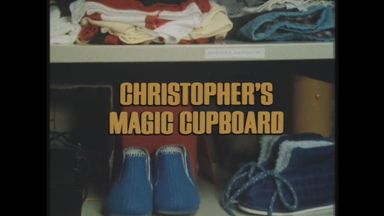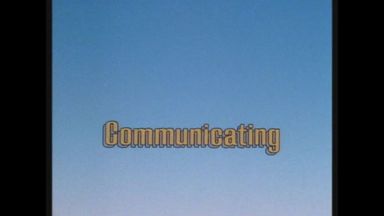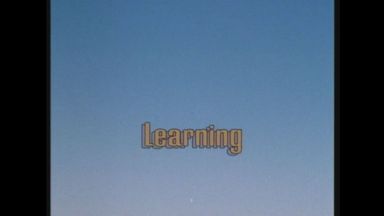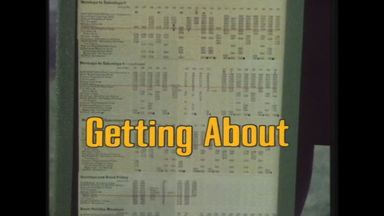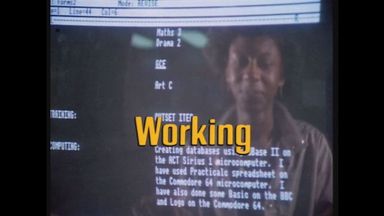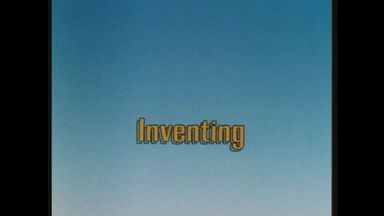With a Little Help from the Chip
4. Getting About
Clips from this programme
Introduction: Micro technology helping getting around even if disabled
Duration: 00:33Weston and Wells talking bus stops (Voice synthesis)
Duration: 02:05Micro technology helping getting around - Moving limbs (Springfield school, Huntingdon) Toy Monkey (Sheila Sherwood, Community Physiotherapist) visual feedback, computer aided movement control, electrodes, walking frame
Duration: 07:05Powered Wheel Chairs, energy saving computer (Wayfarer chair), head switch control of Wheel Chairs (Elfin) and other support computers
Duration: 03:43Powered Wheel Chair for children (Louise (and Ruth) Everard)
Duration: 03:35Learning to drive for the disabled (Banstead Place Mobility Centre), reaction testing, steering by shoulder control, adapted vehicles
Duration: 05:11With a Little Help from the Chip
1. Christopher's Magic Cupboard
First broadcast: 30th August 1985
Duration 48:50
Six programmes on how micro-technology can help disabled people to live more independent lives. Christopher's Magic Cupboard. Christopher is 4 years old. He's bright, mischievous and full of life but he's severely physically handicapped. Now, micro-technology is beginning to change his life, enabling him to do things the rest of us take for granted - learning, playing, getting about, communicating, and being naughty for the first time in his life. The 'chip' is very versatile: with it, blind people can read books, deaf people can use the telephone and people who couldn't speak or write at all can now make contact with the outside world. But can the miracle chip reach all those who need it? Film editor JOHN BILLINGHAM Assistant producer GEORGE AUCKLAND Producer ANNA JACKSON
2. Communicating
First broadcast: 6th September 1985
Duration 24:21
Six programmes on how micro-technology can help disabled people to live more independent lives. 2: Communicating. After 13 years of silence, the chip has given Michael Waelchli a voice. Patrick Murphy is deaf and blind, but he can now read, take notes, use the telephone, send and receive letters and get the latest news from his television. Young Julia Mason has never been able to speak or write - now for the first time she can communicate with the outside world. Film editor PETER ESSEX Producer ANNA JACKSON
3. Learning
First broadcast: 13th September 1985
Duration 24:31
The third of six programmes on how micro-technology can help disabled people. Learning. The chip can help blind children to learn Braille - and convert it to print for their teachers; it can help deaf children to learn language; good computer programs can stimulate and reward those with learning difficulties; and a combination of hardware, good programs and special switches can enable severely physically handicapped children to learn. Film editor PETER ESSEX Producer ANNA JACKSON
4. Getting About
First broadcast: 20th September 1985
Duration 23:57
The fourth of six programmes on how micro-technology can help disabled people. Getting About. A talking bus stop and wheelchairs that climb kerbs, that raise and lower, or that can be operated by two switches - the versatile chip is the key to all these. It can also improve muscle-control, and help you learn to drive. Producer ANNA JACKSON Director CATHERINE ROBINS
Now playing
5. Working
First broadcast: 27th September 1985
Duration 23:06
The fifth of six programmes on how micro-technology can help disabled people. Working. Kenny Matheson and Pat Magee both work from home, thanks to the chip; Rhoda Carratt is blind and holds down a secretarial job with the help of some enabling micro-technology; and a new information system on computer finds the best aid to help a person at work. Producer ANNA JACKSON Director CATHERINE ROBINS
6. Inventing
First broadcast: 4th October 1985
Duration 24:01
The last of six programmes on how micro-technology can help disabled people to live more independent lives. Inventing. Britain leads the world in inventing aids for disabled people. This programme follows the development of a number of different types of aid, from the Micromike, made in an airing-cupboard in the inventor's home, to the Electronic Book, now marketed by Tandy. It looks at some of the pitfalls, the achievements and sources of help and advice. Film editor JOHN BILLINGHAM Producer ANNA JACKSON Director GEORGE AUCKLAND









